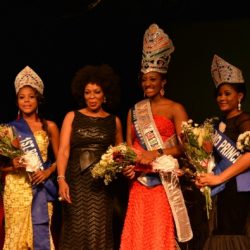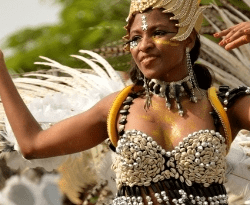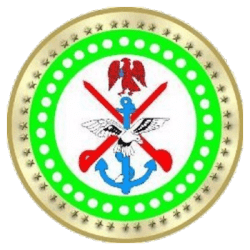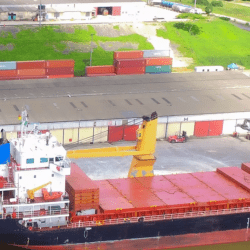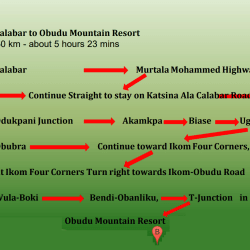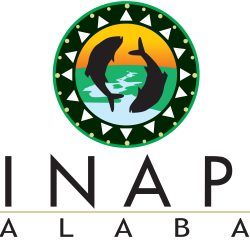 The Masta Blasta Band also known as “The Orange Family”, is the largest & most entertaining of the 5 principal bands of the annual Carnival Calabar.
The Masta Blasta Band also known as “The Orange Family”, is the largest & most entertaining of the 5 principal bands of the annual Carnival Calabar.
The Masta Blasta Band was established in December 2005. Also known as the “Orange Family” our band has a membership base of over 10, 000 members from all over the world. We are the largest and most entertaining of all the 5 competing bands on parade during the annual Carnival Calabar (the largest street party in Africa).
We have evolved over the years to become a brand name of choice and reference point, through the charismatic leadership of the band leader in the person of Chief Gershom Bassey. The Masta Blasta Band, is the only band that accommodates and caters for the “belonging” need of all segments of the society. Our all inclusive approach to the Carnival Calabar encourages an enviable synergy between family, friends and embraces the participation of both local and international visitors to the joys of taking part in an international carnival parade.
The Orange Family is currently the overall champions of the 2012 and 2013 Carnival Calabar. We are on record, as the only band that has won the most prices in all categories of the competition within a single year, in the entire history of the Calabar Carnival.
Carnival Calabar
Carnival Calabar is a unique display of Africa heritage showcased through music, dance, drama and visual creativity which is reflected in the design of floats, costumes and make-up. The event takes place in Calabar, Cross River, Nigeria.

Despite the fun and relaxed atmosphere around the carnival, there also exist thought, creativity and discipline.










Cross River
Cross River, a state in southern Nigeria, close to the Atlantic ocean to the South and Cameroon to the East.

Benue State bounds it to the north, and the states of Ebonyi and Abia bound it to the west. It is bound by Akwa Ibom State to the southwest.
Cross River State, richly tropical, is home to peoples with diverse history and culture.
The state occupies a land area of approximately 23,015 sq. km.
Administratively the state is divided into 18 Local Government Areas.
The capital city, Calabar, was a historic trading post for slaves, oil produce and a hub of European activities. The ancient city of Calabar was the seat of colonial administration of the Southern Protectorate from 1884-1914.
The climate is seasonal-tropical with a distinct rainy season (March – November) and dry season (December – February).
At least five distinct ecological zones can be experienced in the state ranging from mangrove and swamp forests towards the coast, tropical rain forests further inland, and savanna woodlands in the northern parts of the states. The highlands of the Obudu Plateau offer montane type vegetation.
Cross River State, with its gentle, warm and courteous people, unique cuisine, elegant and colourful culture, and rich biodiversity is a place to visit.
There are over 20 ethnic groups in the state. The major ethnic groups and languages spoken in the state include Efik, Ejagham, Boki, Yakkur, Yala, Ukelle, Mbembe, Utugwang, Bette, Mbube, Yache and Bakor.
Created: 27 May 1967
Cross River was initially created in 1967 as South-Eastern State
Name
In 1976 the state was renamed as Cross River, referring to the River Cross or the River Oyono. The river rises from the Cameroon Mountains and empties itself into the Atlantic Ocean.
Capital: Calabar


Boundaries
Cross River State is bounded to the East by the Republic of Cameroon, to the South by Akwa-lbom State and the Atlantic Ocean, to the West by Abia and Ebonyi States and to the North by Benue State.



Rank in land size and population
The State is the 19th largest state in Nigeria in terms of size and 28th in terms of population.

Major languages
Ejagham and Efik are the major spoken languages in Cross River State.

Efik language
The Efik language is widely spoken in Cross River State, and as far as Arochukwu in bordering Abia State.
Capital city
The capital is Calabar, one of Nigeria’s cleanest and safest cities. It also has a major seaport.

Local Government Areas
There are 18 Local Government Areas (Abi, Akamkpa, Akpabuyo, Bakassi, Bekwarra, Biase, Boki, Calabar Municipal, Calabar South, Etung, Ikom, Obanliku,
Obubra, Obudu, Odukpani, Ogoja, Yakurr, and Yala) in Cross River State that make up three senatorial districts.

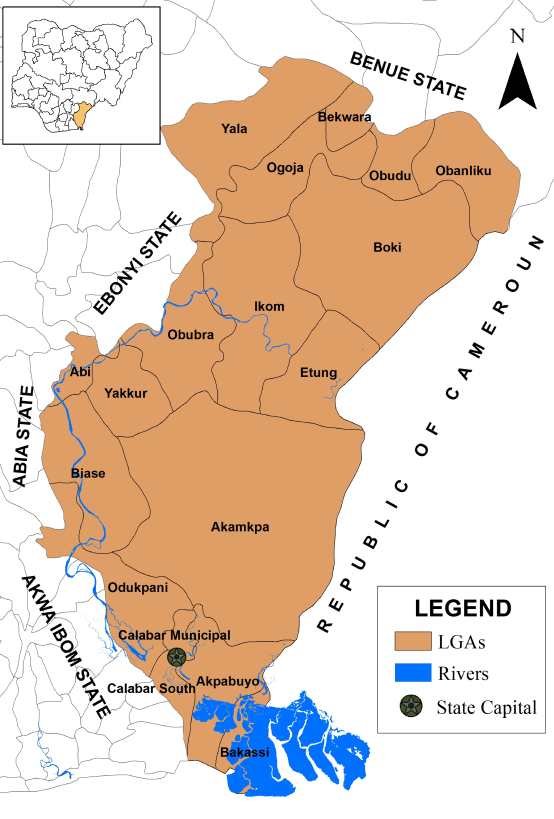
Major cities
Cross River State major cities are Calabar, Ugep, Ikom, Obudu, and Ogoja.
Major road
Only one major (federal) road connects 10 local government areas from the popular Watt Market in Calabar. They are Calabar South, Calabar Municipal,
Odukpani, Akamkpa, Biase, Yakurr, Obubra, Ikom, Yala, and Ogoga. The road still goes on to Kastina-Ala in Benue State.
Forests in Boki Local Government Area
The rarest animals and plants in Cross River State can be found in forests located in Boki Local Government Area.
Species of butterflies in Akamkpa Local Government Area
One of the highest concentration of different species of butterflies in the world can be found in the Akamkpa Local Government Area of the State.
Sparsely settled state
With an average population density of about 65 persons per square kilometre, Cross River State is about the most sparsely settled state in Southern Nigeria.

Largest carnival in Africa
Cross River State boasts of being the venue for the largest carnival in Africa.
Various annual festivals are the Cross River State Carnival (26-29 December) in Calabar, the Yakurr Leboku Yam festival (28 August) in Ugep and the Calabar Boat
Regatta.
Tourism
Cross River State is the leading tourism state in Nigeria. Especially the capital, Calabar. Visitors from different parts of Nigeria come to the city in large numbers
all year round.
Tourist attractions are, the soaring plateaus of the mountain tops of Obanliku, the ObUdU Mountain Resort, the Rain forests and Mountain walkway canopy of Afi,
Waterfalls at Agbokim and Kwa, the monoliths at Ikom, Cross River National Park at Boki, and the Obubra Lake at Obubra.
Others are the Etanpim Cave in Odukpani, the Tinapa Business Resort, Calabar Marina Resort (which houses the Calabar Slave Museum, the Cinema, and a view of the Calabar River where one could take a boat ride around or to Oron in Akwa-lbom State), Calabar Residency Museum, and Mary Slessor Tomb.
Accessibilty
Cross River State can be accessed by air through the Margaret Ekpo International Airport at Calabar and the Bebi airstrip at Obanliku; by sea through the Calabar
seaport and by road from different parts of the country to other parts of the state.
Crops
The main crops can be found in the northern and central parts of the state. These are cassava, yams, rice, plantain, banana, cocoyam, maize, cocoa, rubber,
groundnut, and palm produce. While in the south, various kinds of seafood are mostly eaten.
Livestock
Major livestock in the State are cattle, goats, and sheep. Rearing activities are mainly undertaken by the Fulani herdsmen, except in Obanliku at the Obudu Cattle
Ranch where organized cattle ranching takes place.
Mineral resources
Cross River State Mineral resources include limestone, titanium, tin ore, ceramic materials, and hard stone.
Education
Tertiary educational institutions include the University of Calabar and the Cross River State University of Technology both in Calabar, the Ibrahim Babangida
College of Agriculture in Obubra and Technical College, Ugep.
Famous people
Notable people from Calabar include Louis Edet (Nigeria’s first indigenous Inspector General of Police), Etim Henshaw (The Red Devils of Nigeria’s famous
football team captain), Margaret Ekpo, Donald Duke, Benedict Ayade, Kate Henshaw Nutall, Florence Ita-Giwa, Victor Ndoma-Egba, Shan George, and others
too numerous to mention.







